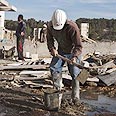
Work crews have broken ground on what they hope will be the first modern, planned Palestinian city – a step officials say will help build an independent state in spite of the current deadlock in the peace process with Israel.
But without Israeli approval of a short stretch of road, the $500-million project may never get off the ground.
"We could build the whole city, but the question is, would people live in a city that doesn't have an access road?" said Bashar Masri, managing director of the company behind the project.
"Obviously, the answer is no."
Since last week, machine operators have been hard at work, taking chunks out of a rocky hillside near this West Bank village. If the project goes according to plan, it will provide 40,000 Palestinians with homes in an American-style development.
Palestinians say Israel has not responded to their requests about the access road. The Israeli Defense Ministry, which is in charge of the area, did not return calls from The Associated Press about the issue.
Israel's stated policy is to promote economic development in the West Bank, and construction of the new town would appear to fall within that goal. But two miles (three kilometers) of the road would have to be built through a part of the West Bank that Israel controls, within view of a Jewish settlement, raising possible complications.
Western-backed Palestinian Prime Minister Salam Fayyad, an internationally respected economist, has announced plans to build institutions regardless of progress in peace talks, aiming to be ready for statehood in two years. The new city, known as Rawabi, would be a key part of that plan.
Rawabi, about 20 miles (30 kilometers) north of Jerusalem, is designed to look much like an American suburb.
Standing over a working model in the office of Bayti Real Estate Investment Company in Ramallah, Masri pointed to the city's egg-shaped, hilltop center, saying it will hold office and residential towers, a conference center and hotel, shops, cafes and a movie theater. The center will be a pedestrian zone with an underground car park, he said.
'Access road critical'
Cities like Ramallah and Nablus have sprawled into the West Bank countryside over the last century, leaving them with insufficient roads, infrastructure and parking space, producing daily traffic jams that snarl their centers.
In Rawabi, by contrast, a series of roads will loop down the hillside, lined with residential buildings connected by footpaths, designed for the Palestinian middle class, Masri said. Residents will have ample parking and access to parks, schools, mosques and a church.
Masri declined to give condo prices, but said 5,000 units are designed for Palestinians who can afford monthly mortgage payments of between $400 and $700. Another 1,000 deluxe units will sell for more, he said.
The project is being funded by Qatari Diar Real Estate Investment Co. and Ramallah-based Massar International.
To help families purchase homes, the US Overseas Private Investment Corp., an investment arm of the US government, is helping establish a mortgage assistance project.
Masri's company plans to start pouring foundations in three months, he said, and says the first residents should move in by 2013.
That is, assuming the city gets its access road.
Reaching the site now means following a narrow, winding road through a number of Palestinian villages. Planners have laid out a new access road, but about two miles (three kilometers) of it cross an Israeli-controlled zone, said Amir Dajani, Bayti's deputy director.
Dajani said the Palestinian Authority has asked Israel to put the stretch of road under Palestinian jurisdiction, but has yet to get a response.
"The access road is an artery for the project," Dajani said. "It is critical for its success and future growth and a prerequisite for its sustainability."
Israeli government spokesman Mark Regev declined to comment on the project, but said Israel considers economic growth in the West Bank "the best antidote to extremism and terrorism."
'It will be similar to life in US'
For now, the project is moving ahead. Last Wednesday, a team of tractors carved a local road into the rocky hillside, while orange-vested surveyors and engineers in hardhats prepared other sites.
Standing on the hilltop slated to host the future downtown, site manager Maher Sawalha pointed to where he hopes to build the city's roads, condos and sewage treatment plant.
Palestinian villages stood clustered on adjacent hilltops, and the Israeli metropolis of Tel Aviv on the Mediterranean coast was clearly visible, about 25 miles (40 kilometers) to the west.
"If it's clear and you have a sunny day, you can see all the way to the sea," Sawalha said.
Sawalha, a 45-year-old father of six, said he planned to move from his rented apartment in Ramallah to Rawabi as soon as possible.
"It's a dream to own a house here, in a new city where you work and live quietly with your kids," he said. "It will be similar to life in the US."















